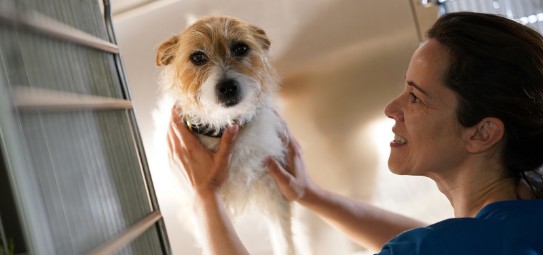
Pet Obesity Health Warning: How to Reduce Your Pet’s Risk
October 21, 2024
Our vets in Teddington are sharing some concerning statistics to support Pet Obesity Awareness Day in October. We want to raise awareness of this growing issue and support pet owners in and around Greater London to improve their pets’ health and wellbeing, so please do share this article.
Book a pet weight consultation now
Key statistics for pet obesity
Alpha Vets’ team have scoured reports from The People’s Dispensary for Sick Animals (PDSA) to bring you a range of stats:
- 1,262 pets (76% dogs, 24% cats) were weighed in The PDSA’s Big Weigh In 2024 campaign – 45% were overweight or obese, which was 46% of dogs and 43% of cats.
- The 2024 PDSA Animal Wellbeing (PAW) Report showed that 49% of UK vets have seen an increase in pet obesity in recent years.
- 25% of vets ranked obesity among the top five welfare concerns for dogs alone.
- 82% of pet owners said they were unaware of their pet’s body condition score, a helpful tool which calculates whether pets are underweight, an ideal weight, or overweight.
- In the 2023 PAW Report, vets estimated that on average, 32% of pet rabbits were overweight or obese.
This might all sound alarming, but our team at Alpha Vets are here to help. Keep reading for more details, or schedule a pet weight appointment with our veterinary nurses now.
Tackling Pet Obesity
Problems and impact on quality of life
Our vets in Teddington want pet owners to be aware of the impact of pet obesity on quality of life:
- Carrying excess weight can cause reduced mobility, joint pain, and elevate health risks in dogs and cats, including heart disease, diabetes, respiratory issues, and certain cancers.
- Obesity in rabbits can lead to a higher likelihood of heart disease, arthritis, liver conditions, flystrike, and skin issues like urine scald and infections.
- Pet obesity can also impact mental wellbeing, potentially resulting in lethargy, anxiety, or even depression.
- Obesity can also make pets more susceptible to heatstroke and reduce their lifespan.
Main causes of pet obesity
1. Overfeeding: Many pet owners tend to overfeed their pets, particularly with treats, which can contribute to weight gain.
Alpha Vets’ team found that according to the 2023 PAW Report, most rabbit owners gave treats for variety (52%), pet happiness (45%), personal enjoyment (29%), or part of their daily diet (24%). Owners also used them for entertainment when they weren’t home (15%) or to distract them (11%).
In the 2022 PAW Report, 60% of owners said they regularly gave their pet human food in some form i.e. leftovers (26%), cheese (22%) and bread or toast (10%). It’s wise to understand that human food can be high in fats and sugar and can contribute to weight problems and pet obesity.
2. Lack of Exercise Sedentary lifestyles can also play a role in pet obesity. The 2021 PAW report found that:
- 38% of dog owners only walked their dog once a day.
- 5% of dogs were walked up to 4 times a week, 4% every other day.
- 29% of dogs were only getting up to 30 minutes of exercise when they were walked.
- 6% of dogs were walked for less than 10 minutes.
- 1% of dogs were never walked at all.
3. Medical Conditions Certain underlying medical conditions may lead to weight gain in pets.
Preventing your pet from becoming obese
Our vets in Teddington want owners to know that incorporating the below methods into your pet care routine can help to prevent your pet from becoming obese:
- Portion Control: Feed your pet the recommended amount of food based on their age, weight, and activity level. Weigh out their food so you can control their intake and adjust where needed.
- Regular Exercise: Ensure your pet gets plenty of daily exercise. This can include dog walks in Greater London, playtime, and interactive toys.
- Healthy Diet: Choose a high-quality complete pet food that is formulated to meet your pet’s nutritional needs. Avoid feeding your pet excessive treats or human food.
- Regular Check-ups: Schedule regular check-ups at Alpha Vets to monitor your pet’s weight and identify any underlying health issues.
What to do if your pet is overweight or obese
Alpha Vets’ veterinary nurses are the best people to talk to about pet weight problems. They can help you with:
- Using body condition scoring as well as weighing scales to determine how much weight your pet needs to lose.
- Gradual weight loss plans that are designed to be both safe and effective.
- Nutritional advice and recommendations for appropriate foods and portion sizes.
- Suggestions for suitable exercise activities based on your pet’s age and health condition.
- Weigh-ins and ongoing encouragement, along with any necessary tweaks to your pet’s weight loss plan.
- Referral to one of our vets if your pet is classed as obese so they can be examined for any related health conditions.
By helping your pet lose excess weight and then maintain a healthy weight, you can improve their overall wellbeing and give them the best chance of enjoying a long and fulfilling life.
So, don’t delay, book a pet weight appointment with one of our highly experienced nurses at Alpha Vets for your pet’s first weigh-in and consultation.





